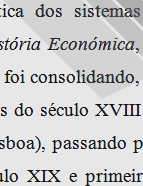

................................
His body of work is extensive and covers various domains and modalities, ranging from essays to erudition, from dissemination to civic intervention, making its analysis somewhat complex, as has already been noted (José Manuel Subtil, "Jorge Borges de Macedo", 1997, pp. 305-307). More directly related to economic history are: A situação económica no tempo de Pombal ‒ alguns aspectos [The Economic Situation in Pombal's Time - Some Aspects] (undergraduate dissertation, 1951); O Bloqueio continental. Economia e Guerra Peninsular [The Continental Blockade: Economy and Peninsular War] (1962); "Issues in the History of Portuguese Industry in the 18th Century" (doctoral thesis, 1963); "Themes in the Economic History of Portugal" (1981). Several other articles of interest to the theme under review may also be mentioned, in addition to those published in the Dicionário de História de Portugal (under Joel Serrão). The following contributions of Macedo's work to economic history have been highlighted: a) formalisation of the concrete and avoidance of abstract analyses; b) identification of factors achievable within society as a whole; c) inclusion of the country's industrialisation in the world market; d) technological issues related to price problems (Luís Aguiar Santos, A História Económica na obra de Jorge Borges de Macedo [Economic History in Jorge Borges de Macedo's Work], 2007, pp. 21-26). In terms of innovative lines regarding the characteristics and objectives of Borges de Macedo's work, the following have also been underlined: a) definition of policies without a system, but with a direction; b) better understanding the kingdom in order to change it; c) and managing the economic situation in order to develop the country (Cardoso, 2013: 93-100 José Luís Cardoso, "Jorge Borges de Macedo: problems ...", pp. 1-8 and Id... "Vitorino Magalhães Godinho ...", e-Journal of Portuguese History, vol. 9, no. 2, 2014, p. 104-114). This latter aspect may be found, for example, in the following reference to Alberto Sampaio, in whose presentation he does not perceive an idea of hopelessness but rather of confidence, evident in the words of the author he quotes: "the only [confidence] we have left is to strive to improve ourselves intellectually, morally and economically, so that the general population can understand its situation and therefore impose a fruitful policy on those who want it " (apud Macedo, 1995: 419 not identifiable). Several other historians, whose work was partially or entirely developed outside the Portuguese university environment, also made significant contributions to the deepening and structuring of economic history as a new historiographical field. Particularly noteworthy from this perspective was Vitorino Barbosa de Magalhães Godinho (1918-2011).
